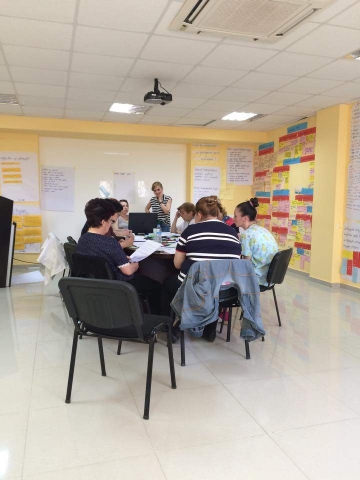Palliative Care Improvements in Children’s New Clinic
The 29th of May marked the first steps towards a promising future for Georgia regarding palliative health care and the Children’s New Clinic, named after I.Tsitsishvili, is the provider of this wonderful news.
Thanks to the innovation of NGO organization Samaritan Association of Georgia, the Palliative Care Unit inside the Clinic is now under reconstruction, and volunteer nurses have been able to receive additional training in order to improve their skills.
Many families in Georgia are overwhelmed with children with disabilities of all kinds. A strong stigma can still be seen against children with disabilities in Georgia and often they are kept at home or behind the walls of orphanages. There are no proper support services for disabled children and their families. Therefore, children with disabilities are often left by their parents and become (de facto) orphans. Most of these children grow up in orphanages, usually with no or inadequate medical and social support. If the orphanages are no longer able to take care of the children, they are transferred to a hospital. In most cases the children are in a very bad condition.
In winter 2013 by order of the Ministry of Health, Labour and Social Affairs, the Children’s New Clinic, Tbilisi established a central department for long-term hospitalised children. Currently, 25 children from four months to twelve years are taken care of in the Children’s New Clinic Palliative Care Unit. They are all severely disabled and need complete 24-hour care. Their mobility is severely limited and communication is in most cases non-verbal. Among those 25 children only six are regularly visited by their parents. Most of the other children have been abandoned.
The parents who do visit their children are left on their own, hardly aware of the condition of their children, and receive neither psychological nor professional support. In the five rooms, in each of which five children are housed, the space is tight, resulting in a lack of privacy for parents visiting children. Although there is an availability of unused space, it has to date been inappropriate and either un-used or, in most cases, used as a storeroom.
The Samaritan’s project includes introducing European standards to the Children’s New Clinic Palliative Care Unit and maintaining the system for two years and, although financial issues exist, the Clinic hopes to keep up with improvements. Training sessions have been and will be organized for nurses, doctors and hospital management in the handling and holistic care and treatment of the children, organized by the Network of International Samaritan. To encourage the children targeted, and allow them an alternative to being constantly bed-ridden, appropriate child-friendly spaces are to be set up (with a full medically-adapted bath, therapy room, lounge and family room) which will be suited to their needs and will allow better nursing and therapy by psychologists, physiotherapists and occupational therapists. Finally, the project aims to improve communication between doctors and nurses and to establish a consulting service for parents.
12 nurses took part in the recent ten-day training given by German nurse Delia Jakubik and the 29th of May was the celebration day of the successful completion of the first training course, with all of the nurses becoming officially certified.
Two of the nurses were more than happy to share their emotions with us: “We have over 40 years working experience but this specific training has made our working specialty a lot more meaningful, interesting and satisfying. We can’t begin to thank the ones who have made this whole project a reality!”
The Samaritans plan to further train the staff of the Unit and to purchase therapeutic medical equipment with the financial assistance of the International Women’s Association (IWA) of Georgia and ASB Germany. USD1 million will be spent by the holding Evex, owners of the Clinic, while the Samaritans will contribute about USD55.000.
“Despite the many possible issues we may face, the working team plans to keep working on this wonderful project. We’re willing to see it to the end,” said Head of the Clinic, David Rekviashvili.












